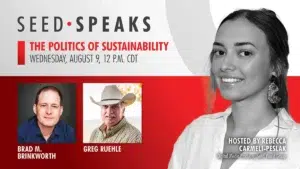Imagine a world where policy decisions are made solely based on science, without politics getting in the way and delaying important decisions that allow innovation to happen unabated.
What a world that would be, but of course we don ‘t live in that world. Instead, policy decisions and processes are often complicated by political debates.
Those debates involve people on multiple sides of multiple arguments making their voices heard, which of course in a democracy is a positive thing. But this political debates pose a challenge to people whose job it is to help enable innovation in the seed space — people like Jennifer Hubert of CropLife Canada and Lauren Colin of Seeds Canada.
Both will appear on this week’s Seed Speaks to talk about how you can learn to patiently wade through political debates and keep you eye on the prize in the effort to ensure important policy decisions are ultimately made and all voices in the discussion are heard.
Jennifer Hubert is executive director, plant biotechnology for CropLife Canada. Like many in the policy sphere, she recently celebrated the new guidance from the Canadian Food Inspection Agency on gene editing which finally clarified that gene edited products will not be regulated the same way GMOs are in Canada. The guidance came after years of patient waiting and advocacy on the part of people like Hubert.
The guidance was delayed due to political reasons and was based on misunderstandings of market transparency and how the sector is going to know what varieties were gene-edited, she said back in February. Hubert will talk about what is was like working through the process and strategies she learned to keep CropLife Canada’s message heard at the legislative level while decision makers heard from a variety of stakeholders during the consultations.
Lauren Comin, regulatory affairs manager with Seeds Canada> has also been in Hubert’s shoes both with regard to the gene editing situation as well as the current Seed Regulatory Modernization (SRM) process. Her previous experience in the wheat and barley industry prepared her well for her current role, and she feels confident in her ability to navigate the politics and relationships within the seed industry, especially at a time when the seed sector is going through profound shifts like consolidations mergers and Seed Regulatory Modernization.
But if anyone can thrive in an environment like today’s seed industry, it’s her.
“There’s an old saying that wheat is 13.5% protein and 86.5% politics,” she says with a chuckle.










